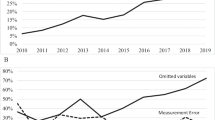Abstract
I consider the prototype New Keynesian macroeconomic model with subjective demand expectations of firms. In this model the firms' objective demand is log-linear in their relative price. Firms believe that their demand curve is linear or log-linear in their absolute price. They estimate the parameters of this curve by least squares from past observations on prices and quantities. The wage rate either clears the labor market given firms' demand perceptions or is given in the short run and changes according to a linear Phillips curve. In either setup of the model the interplay between learning and price setting confirms the subjective model. Among the long-run equilibria are solutions at which the representative household attains a higher level of utility as compared to the rational-expectations outcome. If the supply of labor depends upon the real wage, money is not neutral.
Similar content being viewed by others
References
Ball, L., and Romer, D. (1989): “Are Prices too Sticky?”Quarterly Journal of Economics 104: 507–524.
(1991): “Sticky Prices As Coordination Failure.”American Economic Review 81: 539–552.
Benassy, J.-P. (1987): “The Objective Demand Curve in General Equilibrium with Price Makers.” Working Paper no. 8719, Centre d'Études Prospectives d'Economie Mathématique Appliquées a la Planification (CEPREMAP), Paris.
(1993): “Imperfect Competition and the Suboptimality of Rational Expectations.”European Economic Review 37: 1315–1330.
Blanchard, O. J., and Kiyotaki, N. (1987): “Monopolistic Competition and the Effects of Aggregate Demand.”American Economic Review 77: 647–666.
Duffy, J. (1994): “On Learning and the Nonuniqueness of Equilibrium in an Overlapping Generations Model with Fiat Money.”Journal of Economic Theory 64: 541–553.
Evans, G. W., and Honkapohja, S. (1994): “Learning, Convergence, and Stability with Multiple Rational Expectations Equilibria.”European Economic Review 38: 1071–1098.
(1995): “Adaptive Learning and Expectational Stability: an Introduction.” InLearning and Rationality in Economics, edited by A. Kirman and M. Salmon, Oxford: Basil Blackwell.
Hey, J. D. (1994): “Expectations Formation: Rational or Adaptive or ...?”Journal of Economic Behavior and Organization 25: 329–349.
Killingsworth, M. R. (1983):Labor Supply. Cambridge. Cambridge University Press.
Marcet, A., and Sargent, T. J. (1989): “Convergence of Least Squares Learning Mechanisms in Self-Referential Linear Stochastic Models.”Journal of Economic Theory 48: 337–368.
(1992): “The Convergence of Vector Autoregressions to Rational Expectations Equilibria.” InMacroeconomics: a Survey of Research Strategies, edited by A. Vercelli and N. Dimitri. Oxford: Oxford University Press.
Negishi, T. (1961): “Monopolistic Competition and General Equilibrium.”Review of Economic Studies 28: 196–201.
Rampa, G. (1989): “Conjectures, Learning, and Equilibria in Monopolistic Competition.”Journal of Economics/Zeitschrift für Nationalökonomie 49: 139–163.
Rotemberg, J. J. (1987): “The New Keynesian Microfoundations.”NBER Macroeconomics Annual 2: 69–104.
Author information
Authors and Affiliations
Rights and permissions
About this article
Cite this article
Maußner, A. Learning to believe in nonrational expectations that support pareto-superior outcomes. Journal of Economics Zeitschrift für Nationalökonomie 65, 235–256 (1997). https://doi.org/10.1007/BF01226844
Received:
Revised:
Issue Date:
DOI: https://doi.org/10.1007/BF01226844




